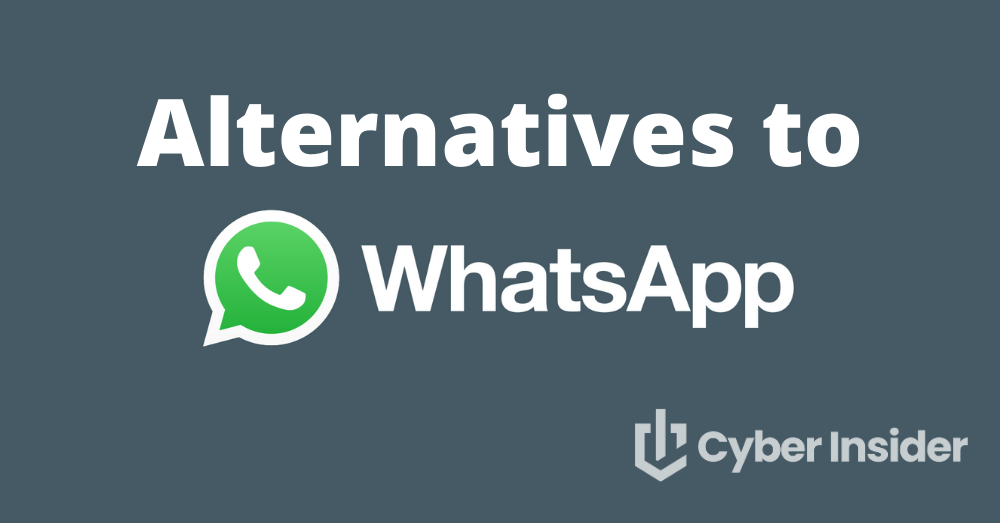
Have previous privacy issues with WhatsApp convinced you it's time to find a new messaging app?
If so, you've come to the right place. In this article we're going to review what the heck has been going on here. Then we'll take quick looks at five secure messaging apps that actually respect your privacy.
Finally, we cover a few of the common questions that people have about WhatsApp, privacy, and alternative secure messaging apps. So let's dive in!
Overview of WhatsApp privacy issues
WhatsApp had a couple of issues that seemed to all be hitting at the same time.
One issue appeared January 10, 2021, when WhatsApp group invite links and user profiles started appearing in Google searches. This could allow someone who spotted such links in a Google search to join the indexed groups.
Thousands of user profiles were also indexed by Google, which could lead to a user's data, including phone number and profile photo, being exposed to outsiders. WhatsApp has reportedly fixed the Google indexing problem — but it may be too late if your data has already been exposed in the wild.
The other issue bedeviling the service at the time is their updated Terms of Service (ToS). Those terms required users to consent to WhatsApp sharing user data with its parent company, Facebook (now called Meta). Yes, this is the same Facebook that has been plagued with privacy scandals over the years.
What kind of data is WhatsApp sharing with Meta? Sensitive data that many people won't want shared. It reportedly includes your user ID, device ID, hardware model, operating system, battery level, signal strength, app version, browser info, mobile network, language, time zone, IP address, phone number, email address, contacts, advertising data, and payment information.
According to this Wired article, WhatsApp has been sharing much of this data with its parent company from many of its users since 2016. But the popups that started appearing back then, along with Facebook's history of privacy issues, seem to have finally tipped the public against WhatsApp. However, there comes the challenge of what to switch to. We've got your back on this one. So let's talk about our top five alternatives to WhatsApp.
Top 5 Alternatives to WhatsApp
There isn't any one service that works as a direct replacement for Meta's WhatsApp. If you ignore the privacy issues, it is an excellent product, with tons of features and a multi-billion person user base.
Our 5 best WhatsApp alternatives each have their own unique characteristics that you need to consider. What they do all have in common is that they don't collect massive amounts of user data, metadata, or personally identifiable information, and they aren't sharing it all with Meta.
We'll start with the messenger app that is getting the most attention these days, with recommendations from people like Edward Snowden and Elon Musk. That messenger app is called Signal.
1. Signal
Signal is a free messenger that features secure, end-to-end encrypted text, voice, and video chats, voice and video calls, as well as secure file and photo transfers. It is built around the Signal Messaging Protocol, widely recognized as the most secure messaging protocol available.
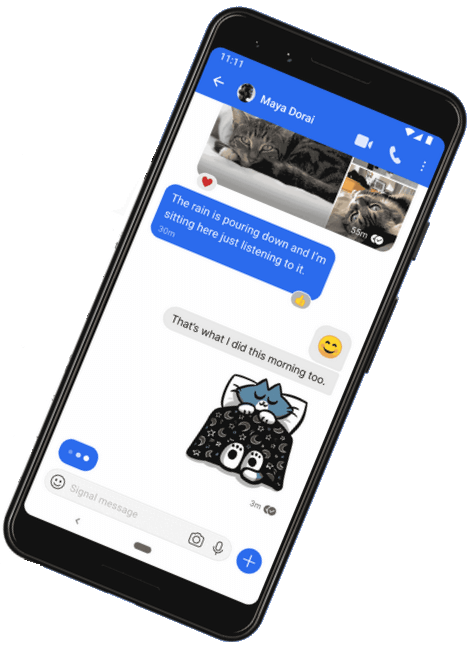
More importantly for this conversation, Signal goes out of its way to gather and store as little of your data as possible. Whereas WhatsApp gathers loads of information and stores it in their own servers, this WhatsApp alternative only records:
- your phone number
- the date and time you joined the service
- the date you last logged on
Any other data Signal uses, such as your contact list, who you have been communicating with, and the groups you belong to, is encrypted and stored on your device. As a result, no one, not even Signal's own personnel, can see any of this data without physical access to your device (or the device of someone who communicates with you).
How good is Signal? Their site features endorsements from experts like Edward Snowden, Bruce Schneier, and Twitter CEO Jack Dorsey. And when the whole WhatsApp controversy blew up, none other than Elon Musk suggested people move to Signal.

You can get the Signal mobile app for free on Android and iOS devices. They also have a desktop version that runs on Windows, Mac OS, and Linux machines.

Sound promising? Learn more about this excellent messenger app in our newly updated Signal Messenger review.
2. Telegram
Telegram is another option if you want to escape from the WhatsApp data disaster. It offers the similar capabilities to WhatsApp, along with a huge user base. Most of the people you want to talk to are likely already using it. Telegram is cloud-based, which lets you use it on multiple devices simultaneously.

They gather less data than WhatsApp does, and they don't hand any of it over to Meta. However, we're somewhat ambivalent about them when it comes to protecting your data. They use server-side encryption for private and group chats that are stored on their servers. That means the team at Telegram can read those messages should they choose to do so. You'll want to use Secret Chats for the most private communications, since encryption is not enabled by default with the Telegram app.
You can get Telegram for Android, iOS, Windows, Mac OS, and Linux.
For more details, see our Telegram Messenger review.
3. Threema
Threema is a mature, powerful messaging app that somehow never gained a wide audience. Unlike some of the other WhatsApp alternatives in this guide, Threema is not free. It costs $3.39, but you don't have to go through the Google Play Store — the APK is also available for direct purchase and download.
With only a few million users worldwide, chances are that most of your contacts have never heard of Threema, much less used it. But if you are concerned with protecting your data from being used by others, it might be exactly the WhatsApp alternative you need.
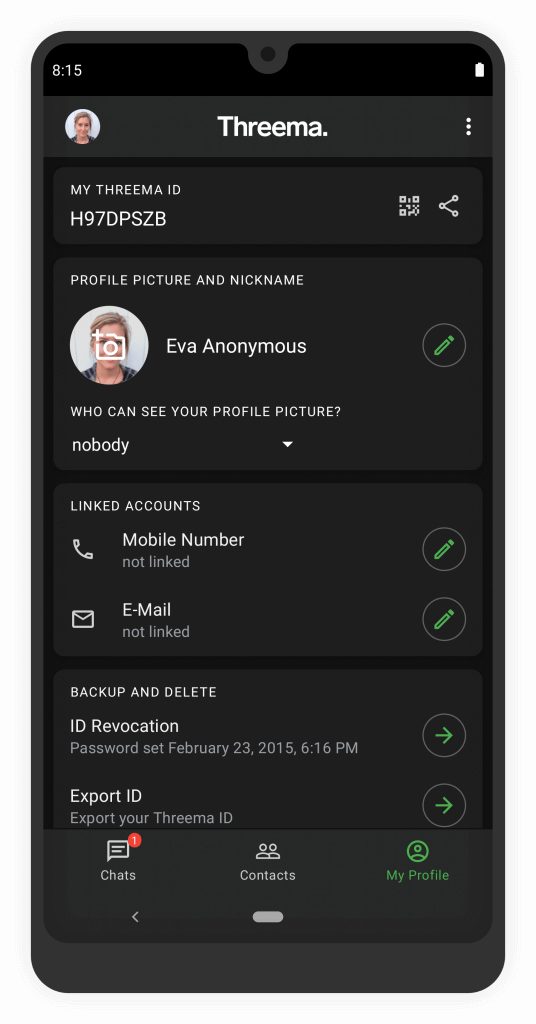
You can use Threema totally anonymously. By default, you are identified on Threema by a randomly-generated ID that isn't associated with any user-identifiable data, and Threema doesn't log anything anyway. The service uses strong end-to-end encryption, so only the intended recipient of a message can read it.
Threema recently completed a transition to open source software, and the code is audited regularly so you can be confident that they aren't doing anything sneaky that could compromise your anonymity.
Threema runs on Android and iOS devices, and also has a browser-based chat for desktop use.
To learn more about Threema, including their special versions for business and educational settings, check out our full Threema review.
4. Wire
Wire is a corporate collaboration suite with secure messaging, group chat capabilities, file-sharing, and more. They also offer Wire Personal, which can be a good replacement for WhatsApp. Wire Personal is open source, end-to-end encrypted software, and it is completely free to use.
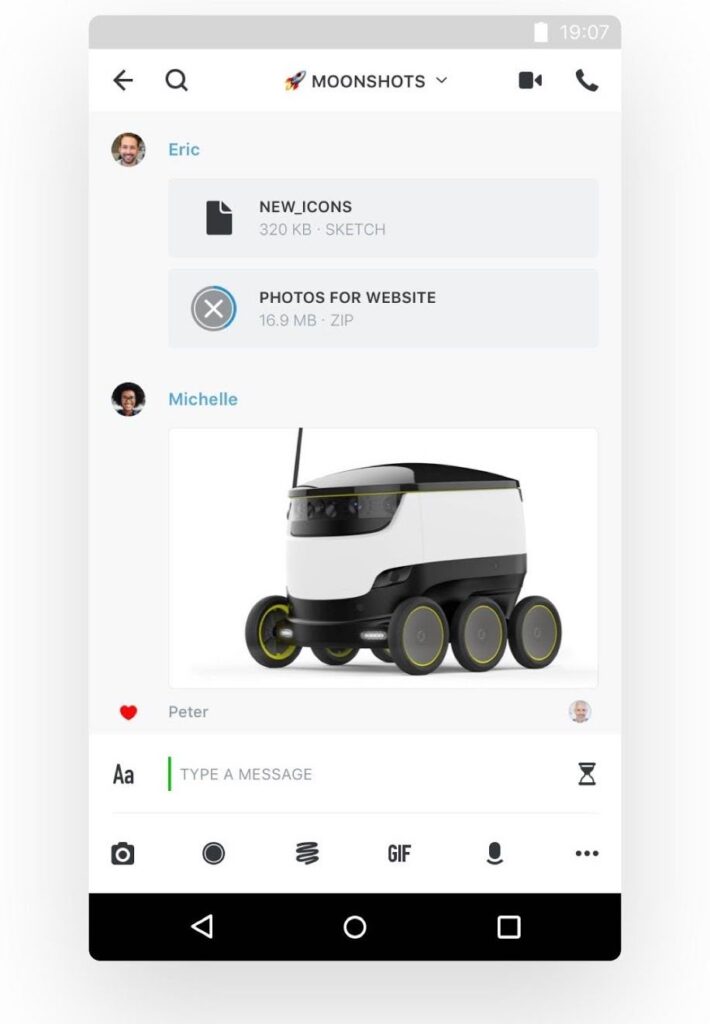
The company does log some data, but not to the extent that WhatsApp does. You need to provide either an email address or a phone number to create an account. Registering with a disposable email address is a much more private way to go than using your phone number.
Like Threema, Wire Personal has a very small user base of only a few hundred thousand users. While it is free and works great now for personal use, it might not be a long-term solution given its limited adoption.
Wire Personal is available for Android, iOS, Windows, Mac OS, and popular browsers.
Get the complete story on Wire Personal in our Wire messenger review.
5. Wickr Me
You know a messenger app is secure when an elite military force chooses to use it for communication in a combat zone. Wickr was recommended for use by the 82nd Airborne’s Task Force Devil when they were deployed at an unidentified location in the Middle East. If the Wickr product line is good enough for them, then Wickr Me is surely a good enough WhatsApp replacement for us civilians.
Wickr Me uses anonymous accounts. With no personally identifiable information for them to log, the kind of problem we are seeing with WhatsApp's use of metadata can't exist.
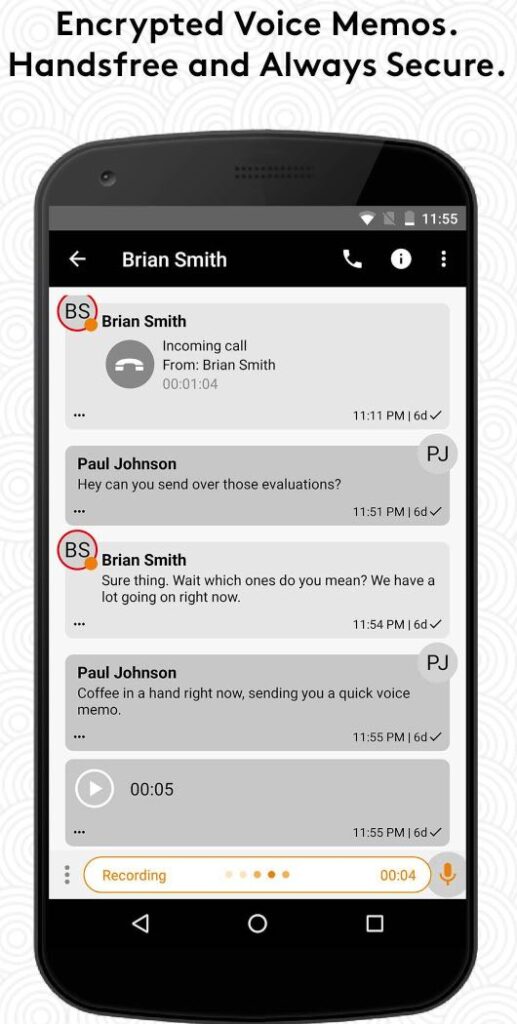
All Wickr Me content is ephemeral. All messages and attachments self-destruct after the length of time you specify. Even if someone invents a quantum computer that can crack the powerful encryption Wickr Me uses, there won't be any messages sitting around on your device to crack.
Wickr Me is available for Android, iOS, Windows, Mac OS, and Linux.
Learn more about the Wickr product line's unique features in our Wickr Me review.
Best WhatsApp alternatives FAQ
Here are some frequently asked questions when the subject of the conversation is alternatives to WhatsApp.
What are the dangers of using WhatsApp?
As of today, one thing that is not at risk when you use WhatsApp is the content of your messages. The service's end-to-end encryption remains secure.
The danger is that WhatsApp collects a massive amount of other personally identifiable information about their users and will share it with Meta, the parent company.
Where is the best place to download WhatsApp alternatives?
It depends on which app you decide to use. Signal suggests you download the mobile app from Google Play or the Apple App Store. Telegram is available through those sources too. But you can also download it from F-Droid if you are an Android user.
Check the website of the messenger app for the latest information on where to download. With all the madness going on right now, it is possible that the instructions will have changed, even in the short time since we published this guide.
Is Signal safer than WhatsApp?
Yes. Both products use strong end-to-end encryption to protect the content of your messages. But WhatsApp gathers a large amount of data which it shares with its parent company, Meta. This data can help identify you with a high degree of accuracy, which means you can be tracked as you travel around the internet.
Signal gathers only your phone number. Signal is also open source and their code has been extensively reviewed by privacy experts. There is no secret recording of user data that could be used to violate your privacy or track you as you move around the internet.
Conclusion on WhatsApp alternatives
If you are concerned with your online privacy, it is time to join the crowd and abandon WhatsApp. While you won't find a competing product with the exact same characteristics as WhatsApp, there are several competitors that could meet your needs. We profiled the top five alternatives to WhatsApp here, and included links to our in-depth reviews of each.
We urge you to download one or more of these messengers and start testing it right away.
This WhatsApp alternatives guide was last updated on January 17, 2025.

The problem with closed source software is that they could disable encryption whenever they want and users would never know. For example. W.app could disable encryption just for 10 minutes, get as much private info which is commercially useful as the wanted, and we would never know since nobody but they could see the changes in the source code. Sure security experts could suspect if they were monitoring it 24/7, but you know what I mean.
That’s why I think no closed source app, even audited ones (audited when, by who, which releases and compilations?) should be ever taken into account when it comes to privacy. This does not mean that open source software has to be free (libre) software not free (gratis), but the code should be verifiable by anyone who fells like verify it does what it has to do and nothing else.
Jami is free for both libre and gratis. Jami is a free/libre, end-to-end encrypted, and private communication software. https://jami.net/
online games safe bet